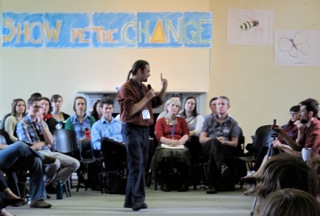 As I sit here it’s mid-afternoon on the first day on the long-anticipated Show Me the Change Conference. About 180 people have gathered in Melbourne to explore topics and pose questions, share ideas and tools around evaluating behaviour change. I’ve met people with a wealth of experience and others bring new enthusiasm; there’s conversations of all shapes and sizes; there’s the usual challenges of working in large groups.
As I sit here it’s mid-afternoon on the first day on the long-anticipated Show Me the Change Conference. About 180 people have gathered in Melbourne to explore topics and pose questions, share ideas and tools around evaluating behaviour change. I’ve met people with a wealth of experience and others bring new enthusiasm; there’s conversations of all shapes and sizes; there’s the usual challenges of working in large groups.
Chris Corrigan opened space this afternoon and about 40 topics went up on the wall to be discussed today and tomorrow. I can sense more topics brewing.
While many people have experienced Open Space as a process before, for many people it’s their first open space gathering. Open space taps into people’s passion around the topic and enables them to set the agenda (rather than a designated group pre-determining what everyone wants to talk about/listen to). Open space is an example of complexity in action.
Every now and again it’s good to be reminded about what makes open space work. Many of us try and intellectualise too much, and make it more complicated than it needs to be. Harrison Owen reminds us about the four principles and one law of open space, and what these mean in terms of the practice of open space in our lives and organisations.
The Principles:
Whoever comes are the right people
Whatever happens is the only thing that could have
Be prepared to be surprised!
Whenever it starts is the right time
When it’s over, it’s over.
The Law of Two Feet
If, at any time, you find yourself in a place where you are not contributing or not learning, then use your two feet and go somewhere else.
In response to a comment on the Open Space List regarding internalising these principles and law, Harrison Owen, wrote the following. I think there’s great wisdom in this.
I suspect that it is more a matter of remembering what we already know and for one reason or another have chosen to repress. All of this goes with the idea that Open Space is truly not something new and radically different. In fact it is a forceful confrontation with a pre-existing condition. We are already in Open Space by virtue of the fact that we have forever been in a self organizing world (the usual 13.7 billion years stuff).
The Law and the Principles are descriptive of normative behavior in a self organizing world, and therefore Open Space, I think. In short, we do all of the above all the time — unfortunately we usually feel guilty about it, and because of this, we tend to do it/them badly, or at least awkwardly and grudgingly. Thus with the Law: when faced with a nonproductive situation (no learning, no contribution) we always leave (hearts and mind out the window) — but the body remains feeling miserable, and making others miserable as well. Once we get the picture, things work better, and we feel a lot better. But it is not about doing something new, or internalizing some new truth — but rather remembering what we already knew and doing what we should/could have been doing in the first place.
Why bother with all this? Well if nothing else, I think it makes our job as consultants and facilitators a lot easier. First of all we are not inviting our clients to engage in risky behavior. Quite the opposite, we are opening a space in which they can really be themselves. And the real risk is to continue with the non-productive, guilt inducing, dependant behavior. The old Marxist Battle Cry might have some application here (with modification): People of the World Unite — You have nothing to lose but your chains.” In a word — Be yourself!
Hear, hear!
Viv McWaters
 As I sit here it’s mid-afternoon on the first day on the long-anticipated Show Me the Change Conference. About 180 people have gathered in Melbourne to explore topics and pose questions, share ideas and tools around evaluating behaviour change. I’ve met people with a wealth of experience and others bring new enthusiasm; there’s conversations of all shapes and sizes; there’s the usual challenges of working in large groups.
As I sit here it’s mid-afternoon on the first day on the long-anticipated Show Me the Change Conference. About 180 people have gathered in Melbourne to explore topics and pose questions, share ideas and tools around evaluating behaviour change. I’ve met people with a wealth of experience and others bring new enthusiasm; there’s conversations of all shapes and sizes; there’s the usual challenges of working in large groups. We’re having our conference dinner at the
We’re having our conference dinner at the